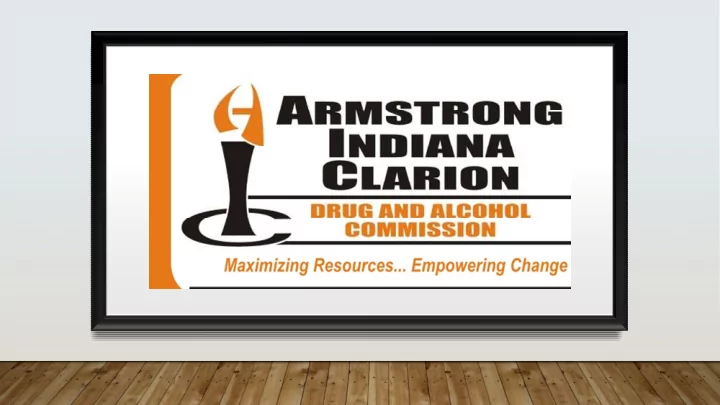

ARMOT PARTNERSHIPS • Collaboration is the key! • Partnerships with three local, rural hospitals: Indiana Regional Medical Center, Armstrong County Memorial Hospital and Clarion Hospital • Partnerships with local Drug and Alcohol Treatment Providers: ARC Manor, Cen-Clear, Conewago-Firetree, Family Services of Western PA, and The Open Door • Agreements/contracts with over 20 Withdrawal Management/Residential Drug and Alcohol Treatment Facilities statewide in Pennsylvania
ARMOT GOALS AND OBJECTIVES • Enhance the linkage between rural hospitals and D&A treatment providers in Armstrong, Indiana and Clarion Counties. • Screen and assess patients with substance use disorders and refer to supportive services. • Increase patient admissions to drug and alcohol treatment from hospital/medical settings. • Educate hospital staff, patients and their families on substance use disorders and recovery. • Reduce patient ED visits, hospitalizations and inpatient stays. • Link patients to treatment and resources 24/7 with CRS Warm Line.
WARM LINE/ON-CALL RECOVERY SUPPORT CRS Staff are available via phone 24/7 • Calls are made to the Crisis Line and • the caller is connected to the CRS for resources, treatment information, and/or will be scheduled for an assessment in our office next business day. Half of callers are looking for treatment • and the other half are looking for resources/information for their loved ones. 81% of callers that met with AICDAC • staff entered treatment.
ARMOT PROCESS • Hospital Staff identify patients with substance use disorders for referrals to ARMOT Program • Hospital Staff briefly explain ARMOT and get patient permission (verbal consent) to make referral • Case Manager and/or Certified Recovery Specialist meet with patient to further explain ARMOT and options for treatment/recovery support • Case Manager/CRS assist patient with accessing D&A treatment and other supports directly from the hospital.
ARMOT SERVICES • Level of Care Assessments & Referral to Treatment • Coordination of Care • Recovery Support before, during and after treatment – face to face, telephone, recovery checkups • CRS staff understand the patient empathetically in a non-judgmental manner and support them • Self-identify as in Recovery, inspire hope for patients and their family members. • Education, Information and Referrals for families about addiction and recovery • Advocacy
COMPREHENSIVE CASE MANAGEMENT SERVICES • A collaborative process between client and case manager that facilitates access to available resources as well as engagement in the continuum of treatment and support services, while educating clients on the skills necessary to achieve self sufficiency and recovery from substance use. • Level of Care Assessments- American Society of Addiction Medicine (ASAM) • Case Coordination- Service Planning: access to healthcare, basic needs, physical health, emotional/mental health, family, childcare, legal status, education/vocation, life skills, social, and employment DDAP Treatment Manual SAMHSA’s TIP 27
RECOVERY SUPPORT SERVICES • Recovery Support Services (RSS) are non-clinical services that assist individuals and their families to recover from alcohol and other drug problems. These services compliment treatment, outreach, engagement, and other strategies and interventions to assist people in recovery in gaining the skills and resources needed to initiate, maintain, and sustain long-term recovery. RSS are not a substitute for necessary clinical services. • AICDAC employs 8 Full Time Certified Recovery Specialists that are involved in every program.
• Over 1,400 patients referred to the ARMOT Program since 2015 • 72% of patients referred were screened by ARMOT staff • 84% of patients that were assessed went to treatment directly from the hospital ARMOT • 54% of patients completed D&A treatment OUTCOMES • 76 patients re-engaged with ARMOT after a relapse and were placed back in treatment • More than 1,500 local hospital staff have been educated on substance use disorders and the recovery process by ARMOT
Kami Anderson Mike Krafick, CRS Executive Director CRS Supervisor kanderson@aicdac.org mkrafick@aicdac.org 724-354-2746 x302 724-354-2746 x315
Recommend
More recommend